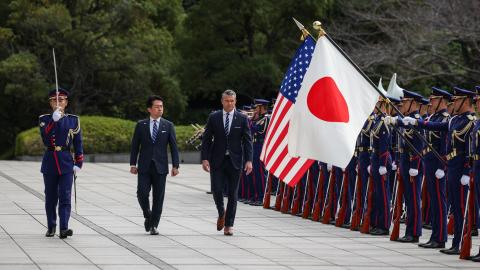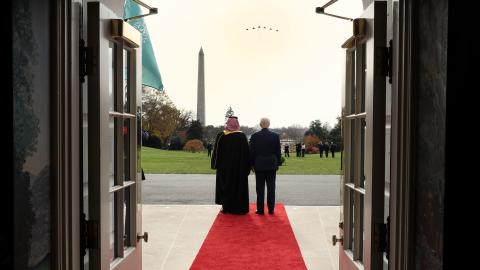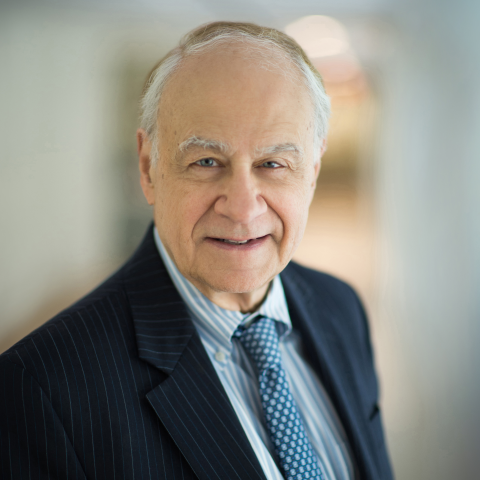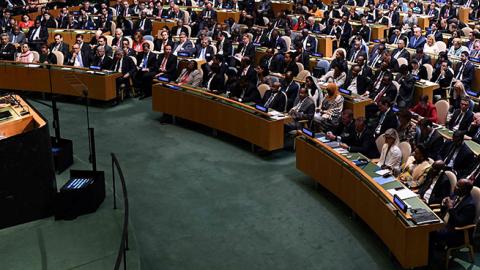p(firstLetter). Daniel Henninger, the usually perceptive deputy editor of the Wall Street Journal’s editorial page, says he’s stumped when it comes to President Trump’s “thoughts on sovereignty.”
“I have no fully graspable idea what he is talking about,” writes Henninger in a recent column on the president’s more than 20 references to the concept of sovereignty in his speech last month to the U.N. General Assembly.
Henninger allows that he understands the necessity of protecting a sovereign nation’s “national security and economic interests.” President Trump, however, “seems to be talking about something more transcendent.” Henninger suggests the concept of “sovereignty as a mystical force” is “an idea brought into the Trump presidency by [former adviser] Steve Bannon and articulated… by [chief speechwriter] Stephen Miller.”
As a matter of fact, the concept of sovereignty as an overarching principle of the American republic originated not with Bannon and Miller, but with James Madison, John Adams, and the American Founders.
“In America,” Trump told the General Assembly crowd, “the people govern, the people rule, and the people are sovereign.” This is essentially what James Madison wrote in Federalist 46. “The federal and state governments are in fact but different agents and trustees of the people, constituted with different powers, and designed for different purposes . . . . The ultimate authority, wherever the derivative may be found, resides in the people alone.” In short, sovereignty in America means republican self-government. As William F. Buckley’s mentor at Yale, Willmoore Kendall, explained, the Founders in the Virginia Declaration of Rights argued that in political life, the greatest right of all, is the right of a free people to rule themselves.
If Henninger sees a certain transcendent quality in Trump’s vision of sovereignty, he is right to do so. After all, Donald Trump is not the first American president to portray our sovereignty (our independent self-government) in transcendent terms. On June 30, 1826, a week before he died, John Adams chose the words “Independence Forever” to be read to his fellow citizens celebrating the 50th anniversary of the Declaration of Independence on July 4, 1826.
President Trump told the U.N. delegates that the United States would not impose its way of life on others, but to “let it shine as an example for everyone to watch.” He advocated “strong sovereign nations” as political entities in which “people take ownership of their future,” “control their own destiny,” exercise “responsibility,” and “allow individuals to flourish.”
Trump’s muscular language reveals a decidedly republican concept of sovereignty. The emphasis is on citizens taking “ownership” of their own nations. This theme is directly connected to the idea of active and responsible citizenship, an idea that did not originate with Bannon or other Trumpists, but—as Hillsdale College government professor Thomas G. West explains in his brilliant new book, The Political Theory of the American Founding—was an idea central to the natural rights philosophy of our Founding Fathers.
Further, citizens expect leaders of sovereign nations to be accountable. Trump’s speech notes that the “two core sovereign duties” of nations are “to respect the interests of their own people and the rights of every other sovereign nation.” These sovereign duties represent the “vision” of the United Nations and are the “foundation for cooperation and success.” Clearly, those nations explicitly condemned in the president’s U.N. address—North Korea, Iran, Cuba, and Venezuela—violate one or more of those core sovereign duties.
Those were the idealistic parts of the president’s speech and constitute the principles of sovereignty consistent with his foreign policy goal of “principled realism.” What about the relationship between sovereignty and realism? Daniel Henninger asks what Trump’s concept of sovereignty means “in any feasible operational sense for U.S. policy makers”? He concludes that it is “largely irrelevant” to U.S. officials who implement American global strategy as a practical matter.
But seasoned foreign policy practitioners such as the late Jeane Kirkpatrick and former U.S. Senator Jon Kyl (R-Ariz.), and a group of thinkers (including many Federalist Society law professors) dubbed by their opponents as the “new sovereigntists” would disagree with Henninger’s dismissal of the “operational” significance of sovereignty for global politics.
Writing in Commentary 17 years ago, President Reagan’s former U.N. Ambassador Jeane Kirkpatrick declared: “foreign governments and their leaders, and more than a few activists at home, seek to constrain and control American power by means of elaborate multilateral processes, global arrangements, and U.N. treaties that limit both our capacity to govern ourselves and act abroad.”
The desire to limit American sovereignty is exemplified by the November 2002 statement of then-Mexican Foreign Minister Jorge Castañeda (widely considered pro-American), who declared: “I like very much the metaphor of Gulliver [the U.S. is understood as the giant Gulliver], of ensnaring the giant. Tying it up with nails and thread, with 20,000 nets that bog it down: these nets being norms, principles, resolutions, agreements, and bilateral, regional, and international covenants.”
For years, Federalist Society law professors including David Rivkin, Lee Casey, Jeremy Rabkin, and others, have warned the readers of the Wall Street Journal about challenges to American democratic sovereignty in defense and domestic affairs from an array of forces, at home and abroad, purporting to speak for “global governance” above the authority of the nation-state.
In a 2013 Journal column, Sohrab Ahmari reported on his lengthy interview with Jon Kyl, a leading foreign policy and national defense spokesman when he served in the Senate.
Before retiring from the upper chamber, Kyl gave a series of speeches outlining challenges to American democratic sovereignty from those who seek to rewrite the laws of war, curb American freedom of action, and subordinate the U.S. Constitution to transnational laws in both foreign policy and domestic affairs.
Kyl’s core argument is that the defense of American sovereignty is not an abstract exercise but a practical and realistic necessity in the world of 21st century global politics. He cited as an example, the U.N. report by Carla Del Ponte, the chief prosecutor for the International Criminal Tribunal for the former Yugoslavia, stating that the United States is subject to Article 57(2) of Additional Protocol I of the Geneva Convention of 1977 because the protocol is the “contemporary standard” for the laws of war. The United States had refused to accept this section of the treaty, which would require advance civilian warning before an air attack and affords special privileges to irregular forces.
Kyl noted that Del Ponte’s “argument would deprive the United States of an important element of sovereignty: the right to choose its own treaties.” The United States rejected Del Ponte’s claims. During the George W. Bush administration, State Department official John Bolton explicitly “unsigned” the U.S. signature to the International Criminal Court (ICC), a global tribunal that claims legal jurisdiction over American service members and public officials although the United States has not ratified the treaty.
To answer Henninger’s inquiry about the relevance of the concept of sovereignty for policymakers—both the rejection of Del Ponte’s case and Bolton’s forthright repudiation of the International Criminal Court’s authority provide concrete examples of “operationalizing” a defense of U.S. sovereignty against transnational threats.
Although this transnational challenge is not explicitly spelled out in the president’s U.N. speech (there could be other, more appropriate, venues), it is implicit in the speech’s framework and in other presidential speeches, as well as in the administration’s overall stance on the centrality of American sovereignty to a policy of principled realism. Henninger himself wrote in 2009 how “lawfare”—the use (and misuse) of international and national law to wage war by other means—can be a weapon against real American interests and American sovereignty.
Thus, Trump’s speech presents a comprehensive view of sovereignty both idealistic and realistic that is consistent with the president’s other speeches. In this vein, the president’s U.N. speech should be placed alongside his Warsaw speech on Western Civilization as another example of a policy of principled realism that has deep roots in the history of American statesmanship. If Henninger re-thinks President Trump’s presentation of sovereignty in this light, he might, in future essays come up with new formulations.

















